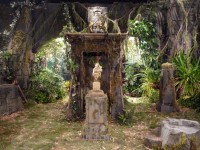So many people are focused on the here and now. Our society is fast-paced and everyone lives for the present. However, history repeats itself. Everyone knows the cliché, yet few people actually take what it implies to heart. Even when people take the time to realize the relevance and impact of the past, very often they do not fully appreciate the extent that the past has to do with each and every day. Berneck and Polluck’s article states that the “relevance of the past…is evident in many facets of daily life”. Very few people realize the truth of this statement. Down to the very structure of our society, the past has influenced our lives. As cultures have evolved and adapted, their habits and ways of life have transcended generations. Without the innovations of agriculture, who knows how long we’d have been hunting for food. Ancient civilizations established governments. Without governments, our world would be in chaos. History and the past have shaped our present and future.
Now, it is the job of archaeologists to interpret the past so we can better understand out future. Many people do not understand this part of archaeologists’ jobs. The reason behind most ignorance, I feel, is that the do not want to believe that there is more to an archaeologist’s job than adventures and digs. There is glamour and razzle-dazzle in the concept of exotic adventures and getting down and dirty in digs. The blind romance is more appealing.
Furthermore, people do not understand the processes used to archaeologists to deduce information about the people and societies of the past. Culture History, Processual, and Post- Processual archaeology are obscure concepts that not many people pay any mind to when they attempt to understand archaeology. The general public finds many hypotheses made by archaeologists to be mere guesses not based on historical or scientific information. I do feel that most people relate Culture History to archaeology, but do not realize where the information is actually coming from.
Very few realize the science that goes into archaeology. The technology present at sites and in the labs is extensive and high quality. The instruments are precise and used for legitimate reasons in determining facts about artifacts and features found at sites. The concept of curses and black magic is much more associated with archaeology than science.
Pop culture certainly does not aid archaeology’s reputation, and the lies start early. In the children’s show The Suite Life on Deck, archaeology takes on its usual mask of guts and glory of gold objects in the jungle. The kids at the school go on “archaeological expedition” into the jungle to find a crown and ancient, royal tomb. The crown is taken from the tomb, and therefore loses the contextual significance that it would hold. This is never addressed though, and kids start learning early that what you can learn from artifacts is so much more important that finding something gold.
The unwillingness to separate from the mysterious and exciting world of adventures and journeys is what is holding back the public from understanding and truly appreciating archaeology for the art and science that is really is.
Real Archaeology
ANTH 100 searches for the truth
